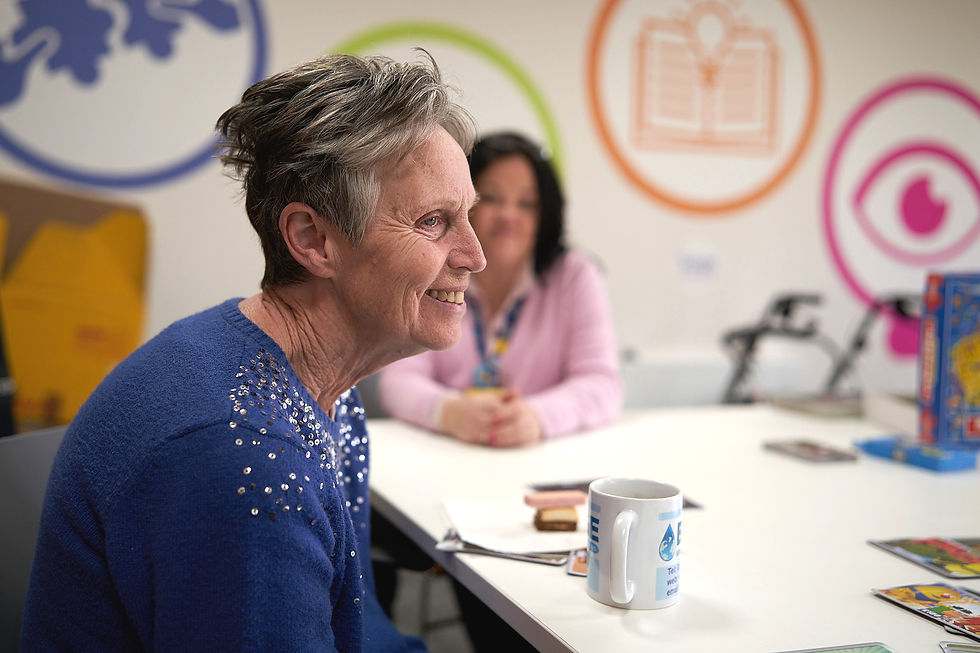How Might Dementia Change a Person's Behaviour?
- Dementia Support

- Jul 18, 2023
- 3 min read
Updated: Aug 21, 2025
When we hear the word dementia, more often than not, we focus on changes in memory function. Memory loss is the most common symptom of dementia in the public eye and it plays a significant role in most dementia journeys. However, what is less frequently discussed is the impact that behavioural changes can have on someone living with dementia and their immediate support network.
As a person’s dementia progresses, changes in behaviour can become more apparent. These may appear as exaggerated versions of an existing behaviour, or as something entirely new and seemingly out of character. Both scenarios can feel equally unsettling and distressing for all concerned. Through this article we will explore what causes these behavioural changes and how best to navigate them when they appear.

How might dementia change a person’s behaviour?
Every dementia experience is different. While some might see a significant and sudden change in their behaviour, or in the behaviour of a loved one, others may witness a more subtle shift. Whichever way these changes present themselves, they can feel disturbing. Knowing what to expect and the reasons behind the changes can help you to cope with them.
Depending on the type of dementia and the stage, people living with dementia may start to behave in ways that seem out of character. You might notice:
a new apathy towards life in general
inappropriate social behaviour
inappropriate sexual behaviour
new compulsive or obsessive behaviours
impulsiveness
lack of empathy for others
changes in likes and dislikes (including food and drink)
a new sense of agitation
paranoia
hallucinations or delusions
Does dementia cause all behavioural changes?
While obviously connected, the progression of dementia can’t always be blamed for changes to a person’s behaviour. If you start to notice unusual behaviour in a loved one, it’s important to consider other factors which could be contributing to a difference in the way they’re interacting with the world around them.
general physical health and well-being
physical surroundings and comfort
mental health in response to a dementia diagnosis
changes in ability to communicate
These elements can have a profound influence over the way we behave, whether we happen to be living with dementia or not. It’s always good practice to ensure that physical, emotional and practical needs have been met before chalking dementia up as the reason for behavioural changes in a loved one.
How to cope with behavioural changes in a caring role
Witnessing any deterioration or change in someone you care for is understandably distressing. As you support your loved one through their dementia journey, it is vitally important that you too reach out for help. Our Wayfinding Team are specialists in helping families and friends to navigate the dementia path together.
If you have established that the general needs of someone living with dementia have been met then any behavioural changes might be a result of the progression of their dementia. Here are some useful tips for managing these changes and keeping you both safe and healthy:
Try to be empathetic and don’t take things personally - this is hard when you’re tired and stressed, so respite for you is important
Keep a record of when the behaviour occurs to observe any links with environmental or other triggers
Keep calm and don’t argue - it doesn’t help to get into a quarrel and keeping yourself calm will help your loved one stay calmer too
Distractions and subject changes can be useful to diffuse escalating situations. Would a snack, walk or some music help to change the subject?
Talk to friends and family before they visit so that they too can follow this advice and be prepared for handling changes in behaviour

Above all, it’s important to take care of your own emotional well-being. You could try a support group or talking to our trained Wayfinders. The Wayfinding team offer one-to-one support for anyone affected by dementia and can give you even more tips on how to cope changes in your loved one’s behaviour.
.png)


